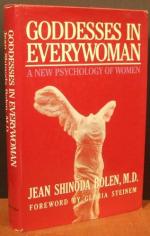
|
| Name: _________________________ | Period: ___________________ |
This test consists of 15 multiple choice questions and 5 short answer questions.
Multiple Choice Questions
1. Who were Athena's usual companions?
(a) Men or boys.
(b) Other goddesses.
(c) Animals.
(d) Nymphs.
2. Who caused the male gods to fall in love with Hestia?
(a) Aphrodite.
(b) Zeus.
(c) Hera.
(d) Artemis.
3. How long had the author had her own mental health practice when she wrote the first edition of Goddesses in Everywoman?
(a) She has never had her own practice.
(b) She had her own practice for a while.
(c) She opened her practice when the book was published.
(d) She had not yet opened her own practice.
4. The author uses what "true life" example in Book 2, Chapter 1?
(a) Nannies bonding with their employers' children.
(b) Social workers bonding with their clients.
(c) Doctors bonding with the babies they delivered.
(d) Nurses bonding with other women's infants.
5. About what did the author have to wait to write a book?
(a) Death.
(b) Mature women.
(c) College.
(d) Men.
6. Every Greek city-state had a mass what?
(a) Food store.
(b) Grave.
(c) Hearth.
(d) Feeding ground.
7. Why does the author choose to incorporate knowledge of the goddesses into her book?
(a) Because the goddesses embody certain characteristics that every woman has.
(b) Because she is a firm believer in the mythos and gods of the ancient pantheons.
(c) Because religion helps people find their reasons for living.
(d) Because categorizing women's personalities using the goddesses helps them identify other women with similar characteristics, to whom they can relate.
8. According to the author, how do Hestian women feel about sex?
(a) They enjoy it and don't like going for long periods of time without it.
(b) They don't like to talk about it.
(c) They don't enjoy it.
(d) They enjoy it but are comfortable without it for long periods of time.
9. From what culture did these goddesses originate?
(a) Rome.
(b) India.
(c) Greece.
(d) Mesopotamia.
10. Why does the author contrast the goddesses in Book 2, Chapter 3?
(a) She doesn't think their similarities are important.
(b) She is afraid readers will get them confused with one another.
(c) She doesn't want readers to think they are all the same.
(d) Their differences are therapeutically relevant, whereas their similarities aren't.
11. The author is most familiar with what type of psychology?
(a) Freudian.
(b) Jungian.
(c) Criminal.
(d) Abnormal.
12. According to Cook 2, Chapter 2, the goddess archetypes are at work where?
(a) Nowhere, because they are archaic.
(b) Only in the women who recognize them.
(c) In every woman and in every culture.
(d) Only in the cultures where they originated.
13. What is the first of two factors that would trouble an Athena woman whose marriage was dissolved?
(a) The fact that she had made a mistake.
(b) The fact that she isn't good-looking enough.
(c) The fact that she is unaware of the situation.
(d) The fact that her husband didn't spend enough time with her.
14. What is the first group of goddesses called?
(a) Vulnerable goddesses.
(b) Maternal goddesses.
(c) Transformative goddesses.
(d) Virgin goddesses.
15. How many male gods fell in love with Hestia?
(a) Three.
(b) Two.
(c) None.
(d) One.
Short Answer Questions
1. When was Apollo born?
2. What is the author's degree?
3. For what weapon did Artemis ask her father?
4. Who is the author of Goddesses in Everywoman?
5. According to the author, when is tension a likely result?
|
This section contains 579 words (approx. 2 pages at 300 words per page) |

|




